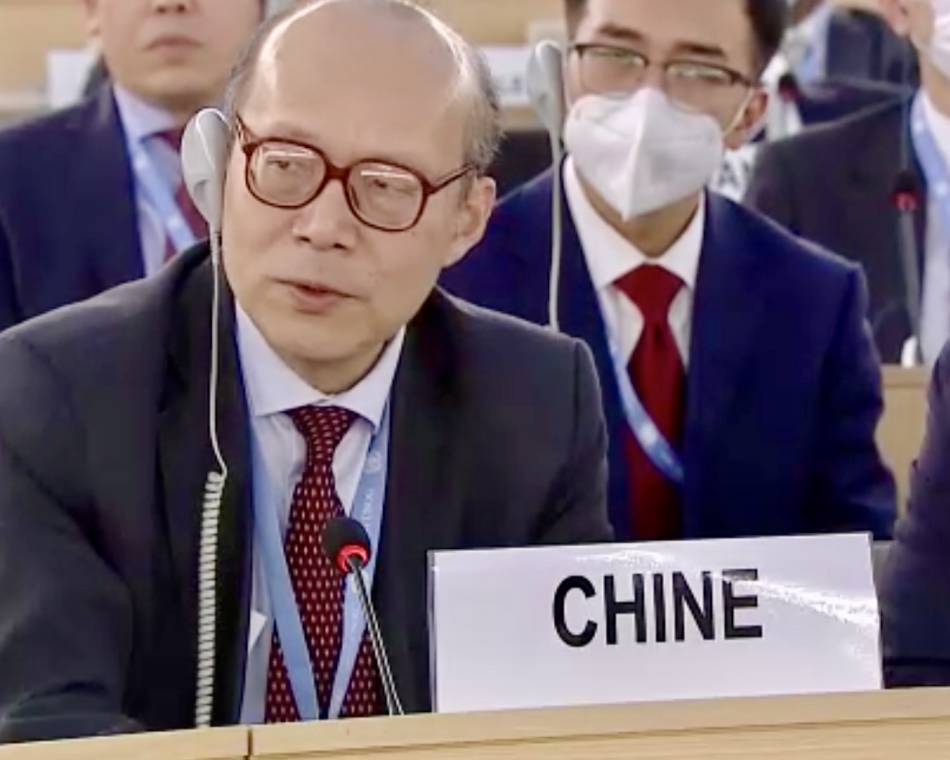GENEVA (AN) — China notched a diplomatic victory with a vote in the U.N. Human Rights Council to reject a Western-led push for a debate over comprehensive evidence of grave rights abuses against Muslim Uyghurs and other ethnic minorities in China’s remote Xinjiang Province.
Human rights advocates were outraged at Thursday's vote in the 47-nation council, the United Nations' top human rights body. Nineteen countries — including China and the Muslim-majority nations of Indonesia, Pakistan and Qatar — voted against holding a debate, defeating 17 countries that voted for it. Eleven nations abstained from the simple majority vote.
“Today’s vote protects the perpetrators of human rights violations rather than the victims — a dismaying result that puts the U.N.’s main human rights body in the farcical position of ignoring the findings of the U.N.’s own human rights office," Amnesty International’s Secretary General Agnès Callamard said, referring to a much-anticipated report from the Office of the U.N. High Commissioner for Human Rights, or OHCHR, last month.
The resolution was put forward by Australia, Canada, Denmark, Finland, Iceland, Lithuania, Norway, Sweden, the United Kingdom and the United States. The debate would have been held at the Geneva-based council's March 2023 session and marked its first examination of a specific aspect of China's human rights record.
China's U.N. Ambassador Chen Xu said China opposed a debate because it "will not promote dialogue, but only lead to new confrontations" between nations.
"Their purpose is not dialogue and cooperation at all, but to provoke confrontation and divergence, and create a 'dangerous shortcut' for introducing country-specific issues to the Human Rights Council," he said. "China is targeted this time, and any other developing countries could be targeted anytime in the future."
The United Nations' usual human rights review — which is obligatory for all 193 member nations, but many of them would rather skip it — last looked at China's overall record in 2009, 2013 and 2018. The Universal Periodic Review, or UPR, is a peer review process that has been used to check on the human rights records of more than 40 nations a year since the council's creation in 2006.
The OHCHR report released at the start of September found China may have committed crimes against humanity in its arbitrary detention and persecution of Uyghurs in Xinjiang, prompting widespread calls for accountability and the Chinese government's scorn.
Days after the report hit, 45 U.N. special rapporteurs, each a specialist in specific human rights themes, said in a joint statement that "China must address grave human rights violations and the world must not turn a blind eye." The long-delayed report broke little new ground but strongly reinforced extensive research by other human rights groups and news media outlets.
In response to the special rapporteurs, Liu Yuyin, a spokesman for China’s diplomatic mission in Geneva, China called the report "a farce orchestrated by the U.S. and some other Western countries and a typical example of politicization and instrumentalization of human rights issues."
#HRC51 | Draft resolution A/HRC/51/L.6 on holding a debate on the situation of human rights in the Xinjiang Uyghur Autonomous Region of #China, was REJECTED. pic.twitter.com/ITbWnqQaKe
— UN Human Rights Council (@UN_HRC) October 6, 2022
'No country should be immune'
The World Uyghur Congress, a Munich, Germany-based international organization of exiled Uyghur groups, said the resolution's opponents "betrayed principles of human rights, non-discrimination and accountability" by refusing to provide a platform where victims and activists could speak to the international community.
It noted that Indonesia, the world’s most populous Muslim nation, and other several nations with significant Muslim populations such as Kazakhstan, Nepal and Qatar had all opposed the resolution, while others such as Argentina, Brazil, Mexico abstained from the vote.
The organization criticized Indonesia and Qatar because they "claimed a commitment to protecting Muslim minorities worldwide, before deciding to reject the holding of a debate on the situation of Uyghurs." It also took issue with Mexico for having "recalled its strong commitment to dialogue and multilateralism, while not being able to endorse a dialogue" sponsored by the council.
Dolkun Isa, the organization's president, praised the resolution's sponsors for their push for accountability "despite the very significant political and economic pressure and threats of China." The organization deeply regrets that 19 governments "decided to oppose dialogue on the issue," he said, and that 11 other nations "preferred to remain silent in light of genocide and crimes against humanity."
After the vote, the U.S. ambassador to the council, Michèle Taylor, applauded nations that took the "courageous step of voting for this measure" but said the U.S. is "disappointed that, by a narrow margin, the council was unable to agree to hold a discussion about serious human rights concerns" raised in the U.N. report.
"No country should be immune from a discussion at the council," said Taylor.
"We will continue to work closely with our partners to seek justice and accountability for victims of human rights abuses and violations, including the Uyghurs in Xinjiang," she said. "We call upon Beijing to live up to its human rights commitments and obligations, and to the ideals for which we all should strive to uphold."









